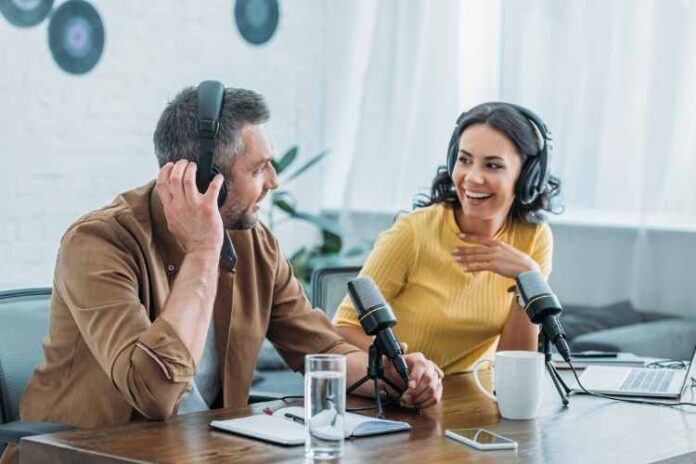Want to start your podcast? Have an idea for a compelling audio show, but don’t know where to begin with the equipment?
Starting a podcast has never been easier in the modern world. With everyday options like social media and voice messaging, there’s no limit to what you can produce.
There is a lot of equipment involved with professional-quality podcasts. So, you may be wondering what the best equipment to start a podcast is and how to get it.
Let’s take a look at the equipment needed to start a podcast and some different options.
Microphones
You need to decide if you want a USB or XLR microphone. USB microphones are typically more affordable and easier to use, while XLR microphones offer better sound quality. You need to decide what type of microphone you want.
Condenser microphones are typically the best option for podcasting, but they can be more expensive. You need to decide what features you need in a microphone. Some features to consider include a pop filter, shock mount, and headphone jack.
Headphones
Consider the type of headphones you want as a piece of important equipment to start a podcast. Over-ear headphones can be bulky and require a fair amount of space, so if you’re podcasting on the go, in-ear headphones may be a better option.
Think about sound quality. If you want your listeners to hear every word clearly, look for headphones with high-quality audio. Lastly, consider comfort. You’ll be wearing your headphones for long periods, so make sure they’re comfortable to wear for extended periods.
Recording Software
The best recording software for podcasting is Audacity. It is free, open-source software that is compatible with Windows, Mac, and Linux. It has a user-friendly interface and is easy to use. It gives you high-quality audio recordings. It is also affordable and will fit within your budget.
Editing Software
There are many different types of editing software for podcasting, each with its own set of features and benefits. The best editing software for podcasting will depend on your specific needs and preferences. Some popular options include Adobe Audition, Audacity, Pro Tools, and Reaper.
Each software has its pros and cons, so be sure to do your research before making a final decision. Ultimately, the best editing software for podcasting is the one that allows you to create the type of content you want to share with your audience.
USB Audio Interfaces
There are a few factors to consider when choosing a USB audio interface for podcasting. The first is the number of channels you need. If you only need one channel, then a mono interface will suffice. If you need two channels, then a stereo interface will be better.
The next factor is the bit depth. A 24-bit interface will give you better sound quality than a 16-bit interface. Finally, you need to consider the sample rate. A 44.1 kHz sample rate is fine for the most business podcast, but if you want to record music as well, you’ll need an interface with a higher sample rate.
Pop Filters
There are a few different types of pop filters that are effective at preventing plosives. The most common type is the foam pop filter, which is placed over the microphone. This type of pop filter will attenuate the plosive sounds without affecting the sound of the voice.
Another type of pop filter is the metal mesh pop filter, which is placed between the microphone and the mouth. This type of pop filter will completely block the plosive sounds but can also affect the sound of the voice.
Mic Stands
When it comes to choosing the best mic stand for proper mic placement, there is no one-size-fits-all solution. The best stand for you will depend on the specific needs of your project.
However, by considering the weight, height, and base of the stand, you can narrow down your options and find the best stand for your needs.
Audio Mixers for Podcasts
The best audio mixers for podcasts can be found by looking at the specs and reviews of several popular models. Some of the best options include the Mackie 402VLZ4, the PreSonus Studio Live 24.4.2, and the Yamaha MG10XU. All of these mixers have unique features and benefits that make them ideal for podcasting.
The Mackie 402VLZ4 has four channels, each with its three-band EQ, making it perfect for mixing multiple audio sources. The PreSonus Studio Live 24.4.2 is a great option for those who need a mixer with a lot of input and output options. The Yamaha MG10XU is a great choice for those who need a mixer with a built-in USB interface.
Portable Recorders
There are a few things to keep in mind when choosing a portable recorder for your podcast equipment. You’ll want to consider the quality of the recording. The best portable recorders will offer high-quality recordings, so you can be sure that your podcast sounds great.
The best portable recorders will be small and lightweight, so you can take them with you wherever you go. You’ll want to consider the price of the recorder. The best portable recorders can be found at a variety of price points, so be sure to find one that fits your budget. There could be some more expert recommendations if you click here.
Get Your Equipment to Start a Podcast Now
If you’re interested in starting a podcast, this guide covers the equipment to start a podcast you’ll need. From audio editing software to microphones and mixers, we’ll go over everything you need to get started.
Did you enjoy reading this article? If so, then be sure to check out the rest of our blog for more!


